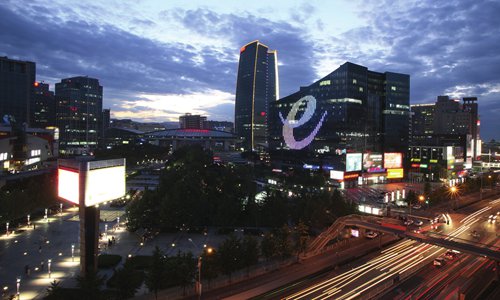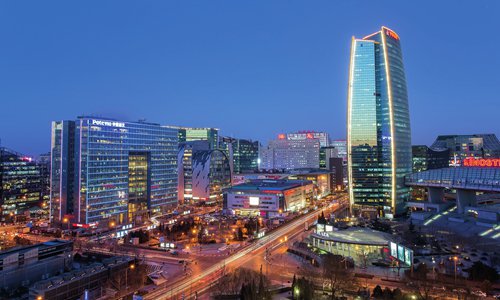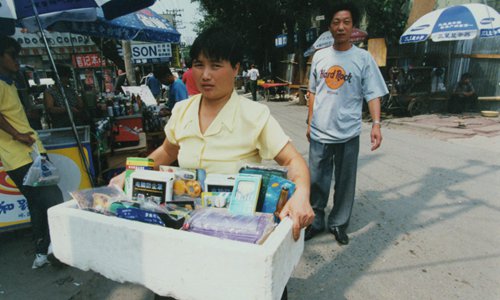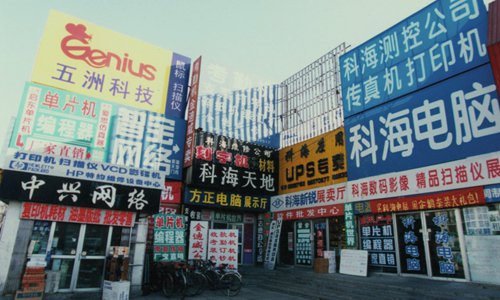
Where there used to be a graveyard for eunuchs until the late Qing Dynasty, now stands China's most valued economic catalyst. Photo: VCG
It's a spectacular success story: What once was a deserted graveyard for eunuchs during the Qing Dynasty (1644-1911 ) is now the cradle for China's tech giants, unicorns and start-ups. Zhongguancun, or China's Silicon Valley, hosts 10 science and innovation parks, where giants such as Lenovo and Baidu were born. On a breeding ground of money, talent, ideas and knowledge, an entire ecosystem of start-ups, incubators, investors and multinationals thrive. Located in Haidian district alongside China's best universities, Zhongguancun is the product of the development of China's market economy that started in 1978 with China's reform and opening-up. In its early years, the area developed into a center of electronic sales. In 2018, China celebrates the 40th anniversary of these extensive economic reforms, and Beijing has made Zhongguancun a "national center of innovation," according to Xinhua.
Zhongguancun marks China's gradual move from industrial production to an innovation-based economy, as it is the area where the Chinese entrepreneurial spirit is at its highest. A plethora of ideas and knowledge boost innovation, and Zhongguancun has fostered efforts in recent years to attract more talent, investors and start-ups from abroad.
The Haidian district government created Zhongguancun Innoway for this reason in 2014.
Jelte Wingender, senior manager at Innoway, connects innovators from abroad (universities, incubators, accelerators, companies or start-ups) with corresponding entities in China.
"Zhongguancun becomes more and more international," Wingender said when asked about the major changes in the area over the years.
"China is very strong in terms of innovation. But one weakness so far is that everything is just Chinese. To become really successful, the next step all those emerging unicorns have to take is to go abroad because China has its limits. This is why it's very important to offer a platform to both Chinese players who want to go abroad and foreign players who want to enter the Chinese market," he added.
As one of the most recent collaborations, Innoway organized the Global Innovation Fair for international cooperation.
Li Jiabin, technology director for Paris Region Enterprises, is in China to explore possibilities of French-Chinese collaboration in innovation.
"We have chosen to collaborate with Zhongguancun and establish an innovation center because we think the entrepreneurs in Zhongguancun are pragmatic and forward-thinking. Moreover, we both want to make some solid contributions to the innovative projects of China and France," Li explains.
Moving from meso- to micro-level, Zhongguancun has also become attractive for job seekers from abroad, with some of them having graduated from the 40 top educational institutions and research centers located in the area.

Zhongguancun becomes more and more international, experts in the tech and startup scenes observe. Photo: VCG

In the 1990s and 1980s, Zhongguancun was famous for its large-scale electronic markets. Photo: VCG

In the 1990s and 1980s, Zhongguancun was famous for its large-scale electronic markets. Photo: VCG
Zhongguancun-based companies alone account for one-third of the national yearly investment amount. Chinese companies such as Xiaomi, American companies such as Oracle and many promising start-ups lure talent with the opportunity to contribute to the development of cutting-edge tech such as artificial intelligence (AI). The government provides incentives as well, such as express Chinese permanent residence cards for spouses of high-level Chinese and foreign talent employed at Zhongguancun, Metropolitan reported in March.
As a result, job fairs in the area have become more globally oriented as well, with Chinese and foreign companies looking for both local and foreign recruits.
"I saw foreigners that spoke different languages trying to find proper jobs in the field of science and technology at the job fair today, which surprised me," Li said, talking about the 2018 Future Talent Fair hosted at Innoway.
Rich Bishop, whose company AppInChina helps international companies publish their apps on the Chinese market, took advantage of the job fair to examine the international talent available. He believes that it is important that innovation is spread across the entire city and country, while having a hub, such as Zhongguancun science city, is very valuable.
"The Zhongguancun start-up ecosystem is one of the world's leading ecosystems. The combination of big companies, universities, investors and start-ups, people and knowledge lead to the creation and growth of lots of ideas," he said.
A small history of Zhongguancun
Ming-late Qing dynasty
Zhongguan cemetery for eunuchs
1949
The Chinese Academy of Sciences (CAS) was established; the eunuch's cemetery disappeared later on.
1952
Construction committees of the CAS, Peking University, Tsinghua and Yanda launched construction of the Science City in the area later called Zhongguancun.
1980
Physicist Chen Chunxian, CAS alumni, laid the groundwork for his idea of a Chinese Silicon Valley at Zhongguancun in creating the first private scientific institution in China.
1980s-1990s Zhongguancun is known as the "Electronics Avenue" in Beijing
1988
The Central administration approved the establishment of the Beijing New Technology Industrial Development Trial Zone.
Late 1990s
Beijing established Zhongguancun as a special economic area.
2005
Over 17,000 new technology companies are registered in Zhongguancun.
Today
Zhongguancun has become one of the largest and fastest growing innovation cities in the world with 10 overseas offices.
